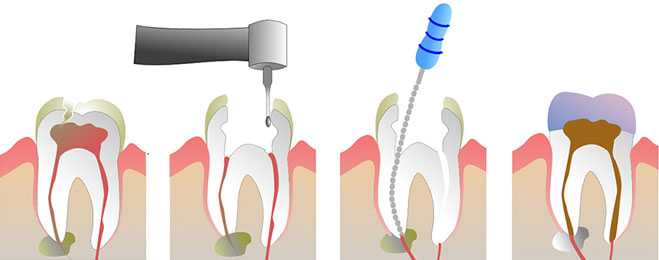Working Time
- Mon-Fri 09:30am - 20:30pm
Sat 10:00am - 20:30pm
Sun Closed
Contact Info
-
Phone: 011-25291118
9716972820
Root Canal Treatment(RCT)

Root canal is a treatment to repair and save a badly damaged or infected tooth instead of removing it. The procedure involves removing the damaged area of the tooth (the pulp) and cleaning and disinfecting it, then filling and sealing it. The common causes affecting the pulp are a cracked tooth, a deep cavity, repeated dental treatment to the tooth or trauma to it. The term "root canal" comes from cleaning of the canals inside the tooth's root.
Root canal treatment consists of a number of steps that take place over several office visits, depending on the situation. These steps are:
- The endodontist examines and x-rays the tooth, then local anesthesia is administered to the affected tooth.
- A dental dam is usually placed over the affected tooth to isolate it and keep it free from saliva.
- The endodontist makes an opening through the back of a front tooth or the crown of a molar or pre-molar to remove the diseased pulp, called a pulpectomy.
- Next, the pulp chamber and root canals are cleaned and shaped in preparation for a filling.
- The endodontist fills the root canal with gutta percha material.
If more than one visit is needed, a temporary filling is placed in the crown opening to protect the tooth between dental visits. The temporary filling is removed and the pulp chamber and root canal are permanently filled with gutta percha into each of the canals and is sealed in place with cement. Sometimes a metal or plastic rod is placed in the canal for structural support. In the final step, a crown is usually placed over the tooth to restore its natural shape and appearance. If the tooth is broken, a post may be required to build it up prior to placing a crown.
Many people worry that a root canal will be painful, something that was true in the past. Today, with advanced anesthesia options and surgical techniques - a root canal is as comfortable as getting a filling. An infected tooth (pre-root canal), is usually what causes tooth pain, and a root canal is the solution to this problem. In fact, infected tooth pulp can cause a tooth abscess and can destroy the bone surrounding the tooth.
A treated and restored tooth can last a lifetime with proper care. Root canals have a high success rate and are significantly less expensive than the alternative, tooth extraction and replacement with a bridge or implant.

